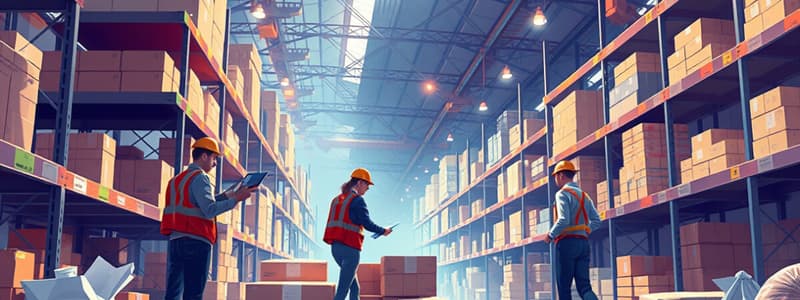Podcast
Questions and Answers
What is the primary goal of modern supply chain management in today's competitive market?
What is the primary goal of modern supply chain management in today's competitive market?
- Increase the complexity of production systems.
- Lead to longer product life cycles.
- Concentrate solely on in-house production.
- Reduce time to market and costs. (correct)
Which components are NOT typically considered part of a supply chain?
Which components are NOT typically considered part of a supply chain?
- Corporate financial advisors (correct)
- Manufacturing centers
- Suppliers
- Retail outlets
How can advances in communication technologies impact supply chains?
How can advances in communication technologies impact supply chains?
- They improve information flow and reduce delays. (correct)
- They create more barriers between suppliers and customers.
- They slow down the flow of goods.
- They increase the reliance on manual processes.
What element is essential for supply chains to integrate demand and supply?
What element is essential for supply chains to integrate demand and supply?
What does the term 'extended quality concept' refer to in supply chain management?
What does the term 'extended quality concept' refer to in supply chain management?
In a supply chain, what is the primary function of warehouses?
In a supply chain, what is the primary function of warehouses?
Which statement best describes the flow within a supply chain?
Which statement best describes the flow within a supply chain?
What is the impact of shorter product life cycles on supply chains?
What is the impact of shorter product life cycles on supply chains?
Which mode of transportation is most likely to enhance cost-efficiency when combining shipments?
Which mode of transportation is most likely to enhance cost-efficiency when combining shipments?
What is a major benefit of optimizing transportation routes?
What is a major benefit of optimizing transportation routes?
Why is high-level responsiveness crucial in supply chains serving the electronics market?
Why is high-level responsiveness crucial in supply chains serving the electronics market?
How can accurate real-time data improve supply chain decision-making?
How can accurate real-time data improve supply chain decision-making?
Which of the following technologies can aid in tracking and data analytics in supply chains?
Which of the following technologies can aid in tracking and data analytics in supply chains?
What is the primary purpose of supplier selection in sourcing?
What is the primary purpose of supplier selection in sourcing?
What role does information sharing play in supply chain collaboration?
What role does information sharing play in supply chain collaboration?
Which of the following best describes an advantage of consolidating shipments in transportation?
Which of the following best describes an advantage of consolidating shipments in transportation?
Which strategy focuses on providing unique products that can be sold at a premium price?
Which strategy focuses on providing unique products that can be sold at a premium price?
Which supply chain strategy prioritizes minimizing waste and enhancing efficiency?
Which supply chain strategy prioritizes minimizing waste and enhancing efficiency?
What type of measure includes costs related to storing and managing inventory?
What type of measure includes costs related to storing and managing inventory?
What does 'Lead Time' refer to in supply chain performance measures?
What does 'Lead Time' refer to in supply chain performance measures?
Which measure assesses the percentage of orders delivered by the promised date?
Which measure assesses the percentage of orders delivered by the promised date?
What is the primary goal of a 'Sustainable Supply Chain'?
What is the primary goal of a 'Sustainable Supply Chain'?
Which supply chain strategy focuses on adapting quickly to changing market demands?
Which supply chain strategy focuses on adapting quickly to changing market demands?
Which of the following is NOT a time-related measure in supply chain performance?
Which of the following is NOT a time-related measure in supply chain performance?
What is a primary challenge of the store-based supply chain model?
What is a primary challenge of the store-based supply chain model?
Which aspect of customer interaction in the store-based supply chain contributes to stock planning?
Which aspect of customer interaction in the store-based supply chain contributes to stock planning?
What advantage does the store-based model provide to customers?
What advantage does the store-based model provide to customers?
What is a significant requirement of the hybrid (omni-channel) model?
What is a significant requirement of the hybrid (omni-channel) model?
How does order processing occur in the store-based supply chain model?
How does order processing occur in the store-based supply chain model?
What is the primary benefit of building long-term partnerships with key suppliers?
What is the primary benefit of building long-term partnerships with key suppliers?
Which of the following is an example of dynamic pricing?
Which of the following is an example of dynamic pricing?
What is NOT mentioned as a contributor to effective supply chain management?
What is NOT mentioned as a contributor to effective supply chain management?
Which barrier to supply chain management involves reluctance to change established practices?
Which barrier to supply chain management involves reluctance to change established practices?
Which component of the supply chain is primarily responsible for storing inventory?
Which component of the supply chain is primarily responsible for storing inventory?
What is a significant consequence of a lack of trust among supply chain members?
What is a significant consequence of a lack of trust among supply chain members?
Which of the following reflects a barrier related to organizational structure in supply chain management?
Which of the following reflects a barrier related to organizational structure in supply chain management?
Which group is at the end of the supply chain process?
Which group is at the end of the supply chain process?
Flashcards are hidden until you start studying
Study Notes
Introduction to Supply Chain Management
- Intense global competition has led businesses to prioritize their supply chains.
- Shorter product life cycles and heightened customer expectations are driving investments in supply chain management.
- Technology advances in communication and transportation are evolving supply chain techniques.
- Key pressures for supply chains include:
- Reduced time to market
- Enhanced system flexibility
- Significant cost reductions
- Comprehensive quality concepts
Understanding Supply Chains
- A supply chain comprises organizations, technology, activities, information, and resources that move products from suppliers to customers.
- It includes a network of retailers, distributors, transporters, and storage facilities.
- Key activities involve transforming raw materials into finished products while managing associated information and financial flows.
- The integration of demand and supply is crucial for fulfilling customer requests.
Transportation in Supply Chain
- Efficient transportation modes (e.g., air, sea, rail, road) impact speed, cost, and flexibility.
- Optimizing delivery routes can lower costs and shorten delivery times.
- Consolidating smaller shipments into larger ones allows for economies of scale.
The Role of Information
- Information sharing enhances supply chain performance and responsiveness.
- Accurate, real-time data improves forecasting, inventory management, and customer service.
- Technology tools like ERP, SCM software, and IoT facilitate better tracking and analytics.
- Collaboration among stakeholders (suppliers, customers, logistics partners) enhances planning and execution.
Sourcing and Pricing Strategies
- Sourcing involves supplier selection, contract negotiation, and collaboration for better quality and innovation.
- Dynamic pricing adjusts based on market demand fluctuations, with promotions influencing customer behavior.
Enablers of Supply Chain Management
- Integration of technology, such as ERP and TMS, streamlines operations.
- Continuous process improvement (e.g., Six Sigma, Lean) maximizes efficiency.
- Investment in skilled personnel is essential for managing complex supply chain operations.
Barriers to Effective Supply Chain Management
- Challenges include:
- Lack of top management support
- Misalignment of strategic philosophies
- Hesitance in sharing information and risks
- Inflexible organizational systems
- Cross-functional conflicts and resistance to change
Components of Supply Chains
- Suppliers: Provide necessary raw materials and components.
- Manufacturers: Transform raw materials into finished products.
- Warehouses: Store inventory to meet customer demand.
- Distribution Centers: Consolidate products for distribution to retailers/customers.
- Retailers: Sell finished goods to end customers, both physically and online.
- Customers: End-users who purchase products or services.
Supply Chain Strategies
- Aligning supply chain operations with business strategies can provide competitive advantages via:
- Cost leadership through minimized expenses
- Differentiation via unique product offerings
- Niche focus tailored to specific markets
- Responsive systems adapting to market changes
- Agility in responding to unforeseen supply/demand shifts
- Lean practices to eliminate waste
- Sustainable practices supporting corporate responsibility
Measuring Supply Chain Performance
- Cost-Related Measures:
- Total supply chain cost includes all associated expenses (procurement, manufacturing, etc.).
- Cost of Goods Sold (COGS) evaluates production costs.
- Inventory holding costs encompass the costs of managing inventory.
- Transportation and order processing costs assess logistical efficiency.
- Time-Related Measures:
- Order cycle time tracks delivery durations.
- Lead time measures process completion times.
- On-time delivery ratios indicate logistics efficiency.
Supply Chain Models
- Store-Based Model:
- Involves physical retail locations; presents challenges in inventory management and responsiveness to market changes.
- Benefits from direct customer interaction and immediate product availability.
- Hybrid (Omni-Channel) Model:
- Integrates online and physical retail channels, enhancing customer experience.
- Requires sophisticated inventory management systems to synchronize stock across various platforms.
Studying That Suits You
Use AI to generate personalized quizzes and flashcards to suit your learning preferences.




